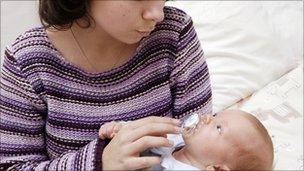Teenagers 'risk premature babies'
- Published

Pregnant teenagers are more likely to give birth prematurely and have a small baby than women in their 20s, says an Irish research team.
Fourteen to 17-year-olds were also more likely to give birth early if they were having a second child, a study of more than 50,000 women in England found.
The findings, reported in BMC Pregnancy and Childbirth, highlighted the importance of routine medical checks.
The team said more studies were needed to find out why the young were at risk.
The study included all women aged between 14 and 29 who had given birth in north-west England over a two-year period.
In all, 3,600 of those were aged between 14 and 17, the researchers said.
More than a third of them came from the most socially deprived areas.
The study also found teenage mothers were also more likely to be underweight.
Those aged under 17 were 21% more likely to have a premature baby with their first pregnancy and 93% more likely to have their second baby early.
There was also a link with younger mothers and having a baby with a low birth weight.
Researcher Dr Ali Khashan, from University College Cork, in the Republic of Ireland, said it might be that the risk of premature birth in the young teenagers was related to "biological immaturity".
"It is also possible that the increased risk of poor pregnancy outcome in the second teenage pregnancy is related to numerous complicating factors such as greater social deprivation and less prenatal care," he added.
The team said teenagers needed to be given proper medical checks during pregnancy and also said more needed to be done to promote contraception after a teenager had their first baby.
Second child
Professor Louise Kenny, consultant obstetrician and gynaecologist at Cork University Maternity Hospital and study leader, said more research was needed to find out the exact cause of premature babies in teenage girls.
She said one issue was that teenage mothers tended to turn up to health services later in their pregnancy than older mothers and were more likely to miss check-ups.
"It's not clear why the risk is greatest for teenagers having their second child," she said.
"It might be that pre-existing risk factors are increased by the physical and psychosocial demand of another pregnancy during teenage years - but again more research is needed."
She added: "We are particularly keen to emphasis the importance of post-natal follow-up, support and adequate counselling regarding contraception for teenagers."
Professor Steve Thornton, spokesman for the Royal College of Obstetricians and Gynaecologists, said he suspected there were a host of complex social and behavioural reasons behind the findings.
"The nice clear message here is that it is even more important for pregnant teenagers to have their antenatal checks to identify if there are any problems."